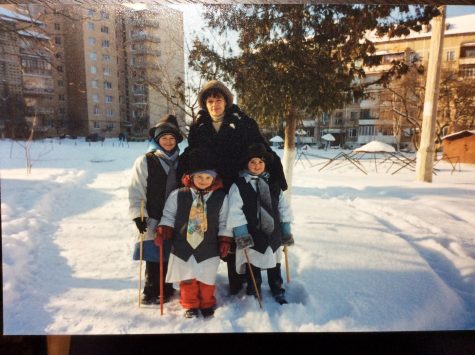Orthodox Holiday Spirit

On Sunday morning, January 8, I will rush downstairs to the kitchen and will be welcomed by my loving parents. They will turn and say, “Good morning! We were wondering if you want to go to school tomorrow since we are still celebrating Christmas.”
Standing there, I’ll be unsure what to do. Should I go to school and miss the last day of Christmas, or stay home with family and miss the first day of the second semester?
Just for a couple of seconds imagine being an Orthodox Catholic (It practices what it understands to be the original Christian faith and maintains tradition passed down from the apostles).
“I really don’t know. I don’t want to miss the last day of Christmas, but I also don’t want to miss the first day of school,” I’ll respond.
They’ll say, “Well you think about it and tell us so we can call you out.”
Orthodox Christmas is from January 7 to January 9. Christmas for Orthodox is different than the Christmas that most celebrate on December 25. Technically, it’s supposed to be a festive week from January 7 to 14, but most people celebrate it for the first two days because it is easier for them and not a lot of time is needed to be taken off from their regular work or school days. Because for Orthodox Christians and those of other faiths, the school calendar is not conveniently built around our holy days.
People dress up, similar to Halloween, but in clothing that representative of people from the Bible where we described Jesus’ birth. People visit homes, sing Christmas songs to others and wish each other blessings which are called Kolyadka, something like Christmas Carols. Some families celebrate Christmas with a 12-course dinner with each course representing one of Jesus Christ’s apostles, which is called the Last Supper.The religious proceedings are, I’d argue, far more connected to the Christian faith than a visit from Santa Claus, yet I’m stuck choosing between them and school.

To talk more about taking days off for religious purposes, Dr. Nick Polyak, Superintendent of Leyden High School shared, “There are many different faiths, many different holidays that people celebrate. So schools can’t take off all of those days; whether it is Jewish, Muslim, etc… it really depends on the parents of the students on whether they want them to stay home on that day.” Although, if wished to stay home and it is for religious purpose then it will be counted as a religious day off.
Even though Leyden is overlapping with the first day of the semester and the Orthodox Christmas, this has the potential to happen during winter break every year. Dr. Polyak explained, “Where those two weeks of winter break fall it is kind of scripted for us. We always want to do it in such way that we give people time to travel and to have some flexible family time, regardless of faith. The two semesters have to be equal length. So that’s why we start so early in August.”
If you wish to stay home for the religious purpose, make sure to email your teachers and explaining to them on why you are absent. Ask them for your work in advance or if you can make it up after you come back. Make sure to work it out with your teachers before you stay home.
Being an Orthodox myself also put me in the spot. I would love to stay in the comfort of my home and spend time with my family, but I would hate to have to miss the first day of second semester. My parents gave me a choice of whether to stay home or to go to school on January 9th, but I’m still contemplating on what I should do. The fact that I have a choice of staying home with for with family Christmas or going school is a very hard decision as to whether or not I want to commit to my education or my cultural value.






